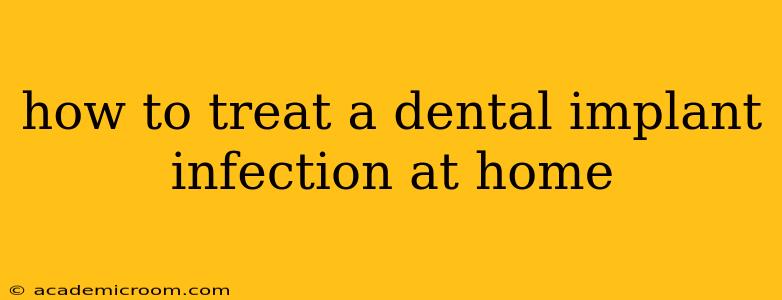Dental implant infections, while relatively rare, can be serious if left untreated. While home remedies can offer temporary relief from some symptoms and support professional treatment, they cannot cure an infection. It's crucial to understand that only a dentist can diagnose and effectively treat a dental implant infection. This article will explore ways to manage discomfort at home while emphasizing the importance of seeking professional dental care immediately.
What are the Signs of a Dental Implant Infection (Peri-Implantitis)?
Recognizing the symptoms early is key. Peri-implantitis, the term for an infection around a dental implant, often presents with these signs:
- Swelling and redness: Noticeable inflammation around the implant site.
- Pain and tenderness: Discomfort when chewing or touching the area.
- Bleeding gums: Bleeding easily around the implant.
- Pus: A yellowish or whitish discharge around the implant.
- Loose implant: The implant may feel loose or wobbly.
- Bad breath: Persistent bad breath, even after brushing and flossing.
Can I Treat a Dental Implant Infection at Home? (The Short Answer: No)
No home remedy can cure a dental implant infection. While home care can help manage symptoms temporarily, it's vital to seek professional dental care as soon as possible. Delaying treatment can lead to serious complications, including bone loss, implant failure, and the need for more extensive (and expensive) procedures.
What Can I Do at Home to Manage Discomfort While Waiting for Professional Care?
While home remedies are not a cure, certain measures can alleviate discomfort until you see your dentist:
1. Gentle Rinsing:
- Saltwater Rinse: Dissolve ½ to ¾ teaspoon of salt in 8 ounces of warm water. Gently rinse your mouth several times a day. This helps to clean the area and reduce inflammation. Avoid vigorous rinsing, which could irritate the area further.
- Chlorhexidine Rinse (Prescription Only): Your dentist may prescribe a chlorhexidine mouthwash, an antiseptic rinse that can help control bacterial growth. Use only as directed by your dentist.
2. Over-the-Counter Pain Relief:
Over-the-counter pain relievers like ibuprofen (Advil, Motrin) or acetaminophen (Tylenol) can help manage pain and reduce inflammation. Always follow the dosage instructions on the label.
3. Cold Compress:
Applying a cold compress to the affected area can help reduce swelling and ease discomfort. Wrap an ice pack in a thin cloth and apply it for 15-20 minutes at a time, several times a day.
What are the Causes of Dental Implant Infection?
Understanding the causes can help prevent future infections. Common factors include:
- Poor oral hygiene: Inadequate brushing and flossing allow bacteria to accumulate around the implant.
- Smoking: Smoking significantly impairs healing and increases the risk of infection.
- Gum disease (periodontitis): Pre-existing gum disease can increase the susceptibility to implant infections.
- Trauma: Injury to the implant site can increase the risk of infection.
- Inadequate implant placement: Improper placement of the implant can create areas where bacteria can accumulate.
How Can I Prevent Dental Implant Infection?
Preventing an infection is far easier than treating one. These steps can significantly reduce your risk:
- Meticulous oral hygiene: Brush and floss thoroughly twice a day, paying special attention to the area around your implant. Consider using an interdental brush to clean between the implant and adjacent teeth.
- Regular dental checkups: Schedule regular checkups and professional cleanings with your dentist. They can monitor the implant site and identify potential problems early.
- Quit smoking: Smoking severely hinders healing and increases the risk of infection.
- Maintain a healthy diet: A balanced diet supports overall health and immune function, helping to prevent infections.
When Should I See a Dentist About My Dental Implant?
Don't delay! If you suspect a dental implant infection, contact your dentist immediately. Early intervention is crucial for successful treatment and preventing long-term complications. The earlier the infection is addressed, the better the chances of preserving your implant.
Disclaimer: This information is for educational purposes only and should not be considered medical advice. Always consult with a qualified dental professional for diagnosis and treatment of any dental condition.
